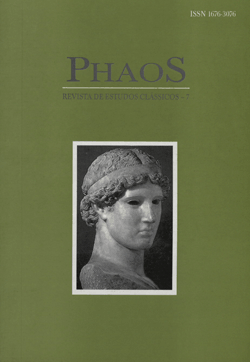Resumo
This paper will explore the First Catilinarian under Foucault's discourse analysis theory. We assume that the context of political disruption triggers an identity crisis where it is essential to present Catilina as a complete "other" regarding what Rome has been and should be. Furthermore, we argue that this text shows certain regularities that enable an interpretation of Catilina's otherness in monstrous terms, which entails the necessity of excluding him from the city. Keywords: Foucault, Catilina, political monster.
Referências
Austin, R. G. (1988). M. Tulli Pro M. Caelio Oratio. Oxford: Oxford University.
Barthes, R. (1982). In vestigaciones Retóricas I. La anügua retórica. Ayudamemoria. Buenos Aires: Ediciones Buenos Aires.
Batstone, W. W. (1994). "Cicero's Construction ofConsular Ethos in the First Caülinarian", Ii•ansactions ofthe American Philological Association 24, 211-266.
Bloch, R. (1968). Los prodigios en la antigüedad clásica. Buenos Aires: Paidós.
Cape Jr., R. W. (1995). "The Rhetoric of Politics in Cicero's Fourth Catilinarian", The American Journal ofPhilology, Vol. 1 16, No.2, pp. 255-277.
Castro, E. (2004). El vocabulario de Michel Foucault. Un recorrido alfabético por sus temas, conceptos y autores. Buenos Aires: Universidad Nacional de Quilmes.
Clark, A. (1991). Philippicae 1-XIV, Oxford.
Corbeill, A. (2002). "Ciceronian Invective", en may, J. M. (ed.). Brill's Companion to Cicero Oratory and Rhetoric. Leiden: Brill.
Diaz-Bone, R., Buhrmann, A.D., Gutiérrez Rodríguez, E., Schneider, W., Kendall G. & Tirado, F. (2007). "The Field of Foucaultian Discourse Analysis: Structures, Developments and Perspectives", Forum: Qualitative Social Research, Vol. 8, N O 2, p. 1-26.
Edwards, C. (1993). The Politics ofImmorality in Ancient Rome. Cambridge: Cambridge University Press.
Ernout, A. - Meillet, A. (1959). Dictionnaire étymologique de la langue latine. Histoire des mots. Paris: Klincksieck.
Foucault, M. (1970). La arqueología dei saber. Buenos Aires: Siglo XXI.
Foucault, M. (1997). El orden del discurso. Barcelona: Tusquets.
Foucault, M. (2000). Los anormales. Bs. As. : F,CiE.
Fredrick, D. (ed.) (2002). The Roman Gaze. Vision, Power, and the Body. Baltimore: The John Hopkins University Press.
Habinek, T. (1998). "Cicero and the bandits", en The Politics ofLatin Literature. Writing, Identity, and Empire in Ancient Rome. NewJersey: Princeton University Press, 69-87.
Hellegouarc'hj. (1972). Le vocabulaire latin des relations et des partis politiques sous la république. Paris: Les Belles Lettres.
Jal, P. (1963). "Hostis (publicus) dans la littérature latine", en Revue des Etudes Anciennes, XV, 53-79.
Kon Stan, D. (1993). "Rhetoric and the Crisis of Legitimacy in Cicero's Catilinarian Orations", en T. Poulakos (ed.), Rethinking the History ofRhetoric: Multidisciplinary Essays on the Rhetorical fradition, Boulder: Westview Press, 11-30.
Lewis, Ch. T. and SHORT, Ch. (1998). Latin Dictionary. Oxford: Clarendon Press.
López Gregoris, R. (2000), "La locura en Roma: Un léxico como recurso literario y argumento político", Myrtia, N O 15, pp. 205-226.
Mayor, J. E. B. (1966). Thirteen Satires ofJuvenal. Hildesheim: G. Olms.
Montero Díaz, S. (1988). "Lajuventud romana en torno a Catilina", en Estudios de Historia Antigua y Medieval. Madrid: Editorial de la Universidad Complutense.
Pagán, V. E. (2005). Conspiracy Narratives in Roman History. Austin: University of Texas Press.
Pina Polo, F. (1991). "Cicerón contra Clodio: el lenguaje de la invectiva", en Gerión 9, 131150.
Reynolds, L. D. (1991). C. Sallusti Crispi: Caülina, lugurtha, Historiarum Fragmenta Selecta, Appendix Sallustiana. Oxford: Clarendon Press.
Roberts, J. (2007). The Oxford Dictionary ofthe Classical World New York: Oxford University Press.
Shackleton Bailey, Dr. (1965-1970). Epistulae ad Atticum, c. comm. & transl., 7 vol., Cambridge.
Wilkins, As. (1887). The Orations ofCicero ag-ainst Catilina. London.

